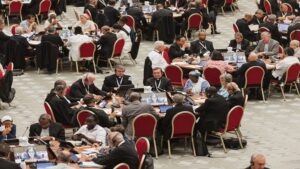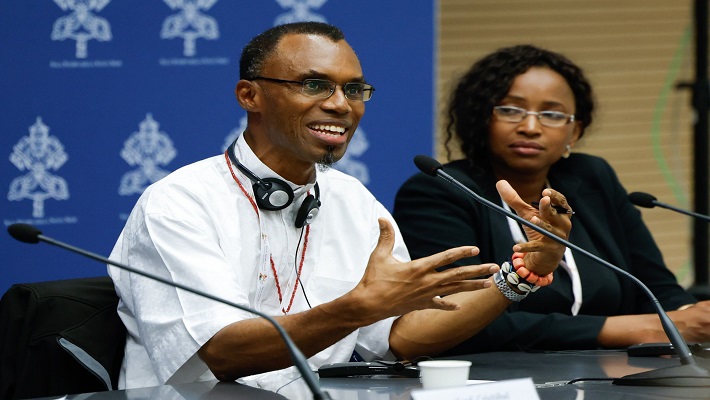CISA
VATICAN CITY, OCTOBER 24, 2023 (CISA)- As the First Session of the Synod on Synodality enters its final stretch this week, Fr Agbonkhianmeghe E. Orobator SJ, the Dean of the Jesuit School of Theology at Santa Clara University, USA, and the immediate former President of the Jesuit Conference of Africa and Madagascar (JCAM) for six years, pens an enlightening experience and unique perspective of the Synod on Synodality.
As a Synod delegate, theologian and director of the African Synodality Initiative (ASI), he provides profound insights into the ongoing journey of the Church’s self-exploration and transformation in this reflection first published by the Jesuit Global on October 19, 2023. He has been involved in the Synodal process for the last two and a half years through ASI, working with the Symposium of Episcopal Conferences of Africa and Madagascar (SECAM) to prepare the stages and phases leading to the synod for the African continent.
Towards a Prayerful, Humble and Listening Church
By Agbonkhianmeghe E. Orobator, SJ
I am a voting member of the 16th Ordinary General Assembly of the Synod of Bishops on Synodality. These days have been moments of deep and prayerful conversations in the Spirit as we collectively seek light to see the will of God and the courage to accomplish it. Talking about a synod as a moment of prayer may seem surprising. For people who are familiar with the workings of a synod, the usual approach involves a marathon of speeches and protracted rounds of voting on predetermined texts prepared in advance or proposed during the meeting only by bishops. Not so this time: participants carry out their work in small groups of mixed compositions, that is, laymen and laywomen, religious, priests, and bishops. They listen to one another in multiple rounds of spiritual conversation.

The layout of the members in roundtables creates an ambience of prayer circles. This makes the atmosphere of the synod prayerful and conducive to interior attentiveness to the stirrings of the Holy Spirit. Speeches and reports are interspersed with moments of silence and interior recollection. The morning liturgies led by the Camaldolese monks are diligently prepared, as are the reflections by the spiritual consultants.
As conceived by Pope Francis, the theme of this synod, “synodality,” implies a common space of listening, dialogue, and discernment about matters of greater moment in the Church. There is something deeply Ignatian about this experience, because discernment and spiritual conversation presuppose that those who are involved take time to pray so that their inputs and interventions come from a place of contemplative recollection. I have found this experience nourishing for my personal prayer. Looking back on my experience so far, this synod on synodality has become a way of practising the graces of listening, dialogue, and discernment in a prayerful manner. It is a new way of being Church.
Time and again Francis has reminded the synod members that the most important protagonist in this exercise of discernment is the Holy Spirit, just as the most important disposition is a prayerful and respectful openness to what the Spirit is saying to the Church as a global community of discernment.
Even if nothing else changes after the synod, the integration of prayer and discernment in common into decision-making processes will be an important part of the goal of becoming a more synodal Church. I am hopeful that the outcome of the synod will be a Church that is more discerning in its ways of proceeding – in other words, a prayerful, humble, and listening Church.
